
Passenger Steamers on the river Irwell in Manchester
The picture below, taken in c.1900, shows a steam packet boat moored at the Cathedral Landing Stage on the river Irwell. In 1894, two steam packet offices were built between Palatine and Victoria Bridges
near Manchester Cathedral. Being intensely rival companies, they provided their own flights of stairs down to floating landing stages moored in the river. In their eagerness to compete they overlooked the fact that
the river channel hereabouts was at its narrowest, being only some 85 feet wide, and that their facilities would be a hindrance to flood water. This problem was exacerbated by the proximity of the confluence of the river Irk
with the Irwell just upstream, which was compounded by the unusual but quite natural feature where the Irk points almost upstream rather than the more usual downstream.
The reason for the introduction of these services was to take advantage of the Manchester Ship Canal, which opened for trade in late 1893 and was then officially opened by Queen Victoria on the 1 January 1894. Regular sight-seeing tours ran around the new Manchester Docks and along the canal to Barton, Irlam and Lymm. Some trips even went as far as Liverpool but the frequency of these is unknown. Mainly due to problems with flooding, the two companies only remained in business for a few years and they closed down in late 1906.
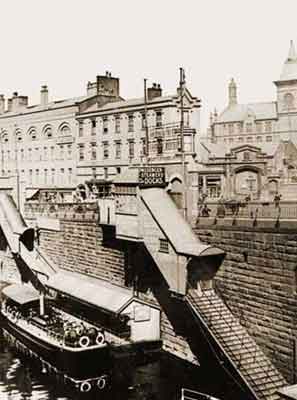
Steam Packet Boat.
The above picture of a steam packet boat shows the Palatine Hotel in the background, built by the Lancashire and Yorkshire Railway Company. On the right is the old Chetham College. The former hotel is now a part of Chetham College of Music.
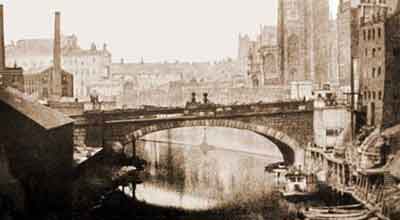
Victoria Bridge.
The above picture shows Victoria Bridge looking upstream past Manchester Cathedral. This bridge has a span of 100 feet and it was opened in 1839 at a cost of nearly £21,000.
The building on the right was Ben Lang's Music Hall. He also owned rowing boats for hire and four passenger steamers, one of which can be seen at the landing stage. These steamers were popular with the public and they ran trips down the river to Pomona Pleasure Gardens near Old Trafford as well as to Throstlenest, a local beauty spot two miles away. Before the coming of the Manchester Ship Canal, Throstlenest Lock was the first to be encountered by boats going down the Mersey and Irwell Navigation on their way to Liverpool. Chetham's College stands centre left in the background and the Palatine Hotel is on the left behind the factories.
Pomona Gardens
These gardens were situated near the confluence of Cornbrook with the river Irwell, originally with the name Cornbrook Strawberry Gardens,
but they were renamed Pomona Gardens after Pomona, the Roman goddess of fruitful abundance.
Later, Dock 2 and parts of Docks 1 and 3 of the Manchester Ship Canal were built on them.
By road they were accessed from Cornbrook Road and from the Salford side of the river Irwell they were accessed by steam ferry or rowing boat.
The site was positioned between the river Irwell (later the Manchester Ship Canal) and the Bridgewater Canal and this gave rise to the name ‘Pomona Island’.
Cornbrook rises in Higher Openshaw on the south side of Ashton Old Road and it follows a winding course (now mostly culverted) to join the river Irwell (now the Manchester Ship Canal) at Pomona.
In 1868 James Reilly (1823/24-1889), a chairmaker, bought Pomona Gardens from the Beardsley brothers and in 1875 his Royal Pomona Palace opened. This was a large concert hall with an imposing clock tower adjoined by pavilions. The palace hosted famous people of the day who visited to make speeches and these included Benjamin Disraeli, John Bright, and the Duke of Devonshire.
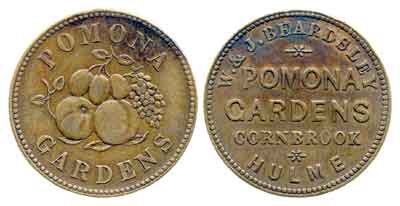
Commemorative medallion.
This medallion was issued by William & Joseph Beardsley in 1845 to mark the opening of Pomona Gardens.
In 1842 the Manchester and Salford Regatta was established along the river Irwell between Regent Road Bridge in Salford and Throstle's Nest in Old Trafford.
By the 1880s Pomona Gardens were failing due to encroaching industrialisation and in 1883 it was considered that some of the docks for the proposed Manchester Ship Canal should be built on the gardens. With this knowledge the gardens struggled on before finally closing in 1888. On the 5 Aug 1885 the Manchester Ship Canal Act, 48 & 49 Vict., was passed that permitted construction of the canal. Work started in 1887 and it was formally opened by Queen Victoria on the 1 January 1894.
Verse
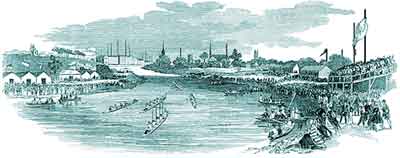
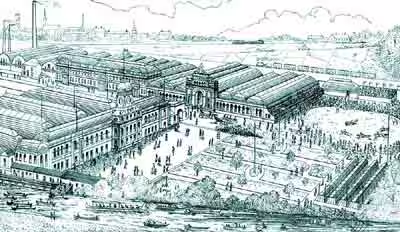
Left: An engraving of the river Irwell showing the third annual Manchester and Salford Regatta in 1844. Pomona Gardens are on the right.
Right: An engraving of the Pomona Gardens and Royal Pomona Palace in 1875. This view is from across the river Irwell and the Royal Pomona Palace is in the left foreground.